
John Kilian Houston Brunner was a British author of science fiction novels and stories. His 1968 novel Stand on Zanzibar, about an overpopulated world, won the 1969 Hugo Award for best science fiction novel and the BSFA award the same year. The Jagged Orbit won the BSFA award in 1970.

The Stardroppers is a science fiction novel by British writer John Brunner. It was originally published at novella-length in 1962 as Listen, the Stars, in Analog and then as part of an Ace Double in 1963; in 1972 the revised, novel-length form was published by DAW Books.
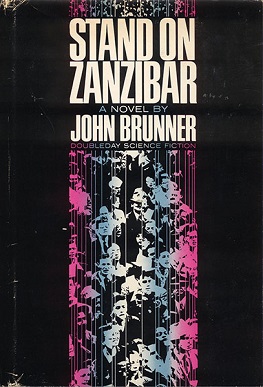
Stand on Zanzibar is a dystopian New Wave science fiction novel written by John Brunner and first published in 1968. The book won a Hugo Award for Best Novel at the 27th World Science Fiction Convention in 1969, as well as the 1969 BSFA Award and the 1973 Prix Tour-Apollo Award.
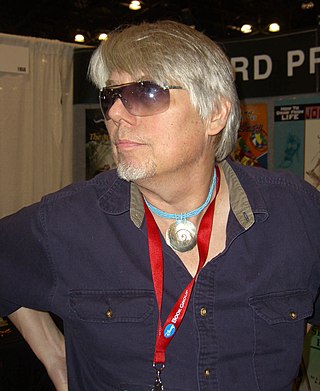
Frank Brunner is an American comics artist and illustrator best known for his work at Marvel Comics in the 1970s.

Theodore Edwin White is a Hugo Award-winning American science fiction writer, editor and fan, as well as a music critic. He writes and edits as Ted White. In addition to books and stories written under his own name, he has also co-authored novels with Dave van Arnam as Ron Archer, and with Terry Carr as Norman Edwards.
The Milford Writer's Workshop, or more properly Milford Writers' Conference, is an annual science fiction writer's event founded by Damon Knight, among others, in the mid-1950s, in Milford, Pennsylvania. It was so named because Knight, Judith Merril, and James Blish lived in Milford when it was founded. It moved to the United Kingdom in 1972 and has run successfully ever since on an annual basis.

The Jagged Orbit is a science fiction novel by British writer John Brunner. It is similar to his earlier novel Stand on Zanzibar in its narrative style and dystopic outlook. It has exactly 100 titled chapters, which vary from several pages to part of one word. It was first published in 1969 with cover art by Leo and Diane Dillon, in the Ace Science Fiction Specials line issued by Ace Books.
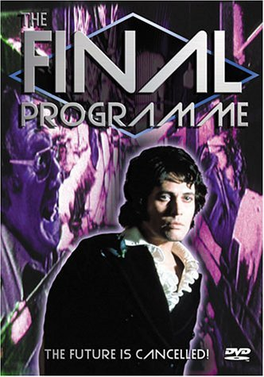
The Final Programme is a 1973 British fantasy science fiction-thriller film directed by Robert Fuest, and starring Jon Finch and Jenny Runacre. It was based on the 1968 Jerry Cornelius novel of the same name by Michael Moorcock. It was distributed in the United States and elsewhere as The Last Days of Man on Earth. It is the only Moorcock novel to have reached the screen.

Secret Agent of Terra is a 1962 science fiction novel by British writer John Brunner. It is the first book of the Zarathustra Refugee Planets series; the other books are Castaways' World (1963) and The Repairmen of Cyclops (1965). Secret Agent of Terra was first published as Ace Double F-133, with The Rim of Space by A. Bertram Chandler.

The Squares of the City is a science fiction novel by British writer John Brunner, first published in 1965 (ISBN 0-345-27739-2). It was nominated for the Hugo Award for Best Novel in 1966.

The 53rd World Science Fiction Convention (Worldcon), also known as Intersection, was held on 24–28 August 1995 at the SEC Centre and the nearby Moat House Hotel in Glasgow, United Kingdom. Evening social events also took place at the Central and Crest Hotels.

Vulcan's Hammer is a 1960 science fiction novel by American writer Philip K. Dick. It was released originally as an Ace Double. This has been considered to be the final outing of Dick's 1950s style pulp science fiction writing, before his better-received work such as the Hugo Award-winning Man in the High Castle, published a year later.
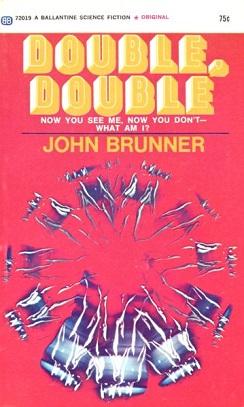
Double, Double is a science fiction novel by John Brunner, first published in the United States as an original paperback by Ballantine Books in 1969 and reprinted in 1979 as a Del Rey paperback. A hardcover edition was released in the British market in 1971 by Sidgwick & Jackson.
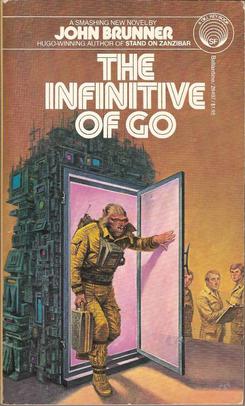
The Infinitive of Go is a 1980 science fiction novel by British writer John Brunner.
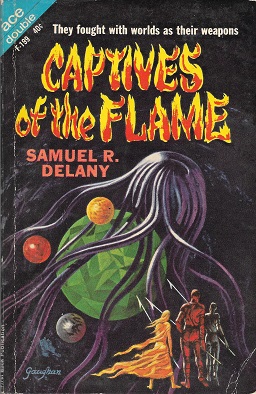
Captives of the Flame is a 1963 science fantasy novel by Samuel R. Delany, and is the first novel in the "Fall of the Towers" trilogy. The novel was originally published as Ace Double F-199 together with The Psionic Menace by Keith Woodcott. It was later rewritten as Out of the Dead City and published by Signet Books in 1968.
The 41st World Science Fiction Convention (Worldcon), also known as ConStellation, was held on 1–5 September 1983 at the Baltimore Convention Center in Baltimore, Maryland, United States.
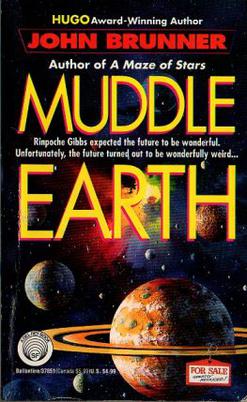
Muddle Earth is a science fiction novel by British writer John Brunner. It was first published in the United States by Ballantine Del Rey Books in 1993. It tells the story of a man awakened from cryogenic suspension in a bizarre 24th century where Earth is a tourist attraction.
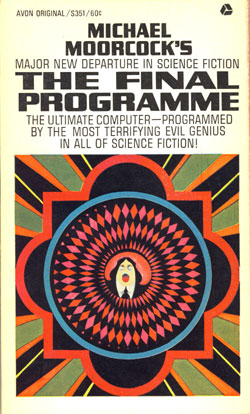
The Final Programme is a novel by British science fiction and fantasy writer Michael Moorcock. Written in 1965 as the underground culture was beginning to emerge, it was not published for several years. Moorcock has stated that publishers at the time considered it was "too freaky".

The Collected Stories of Philip K. Dick is a collection of 118 science fiction stories by American writer Philip K. Dick. It was first published by Underwood-Miller in 1987 as a five volume set. See Philip K. Dick bibliography for information about the mass market reprints.

Biology appears in fiction, especially but not only in science fiction, both in the shape of real aspects of the science, used as themes or plot devices, and in the form of fictional elements, whether fictional extensions or applications of biological theory, or through the invention of fictional organisms. Major aspects of biology found in fiction include evolution, disease, genetics, physiology, parasitism and symbiosis (mutualism), ethology, and ecology.


















